Friends of AHBIC
If you aren’t already a Friend of AHBIC, we welcome you to join our group of organisations and individuals who are supporting Australia’s national beekeeping industry that supports you.


If you aren’t already a Friend of AHBIC, we welcome you to join our group of organisations and individuals who are supporting Australia’s national beekeeping industry that supports you.

Hosted by AHBIC with support of the program team under the National Transition to Management for Varroa.
Including:

Spring has sprung, with what is for many around the country a very dry start to the season. Beekeepers are generally report limited prospects across most of the country with many focusing on pollination this spring.
Beekeepers have reported that the almond pollination event was quick, with generally good weather and almond growers reporting reasonable nut set. Disappointingly we have heard of beekeepers again experiencing high levels of bee deaths on almonds, but to date AHBIC has not received any direct reports from beekeepers. It is impossible for us to work on a solution if no one is reporting the issue directly to us.
At all the state conferences around the country AHBIC has been presenting to industry the proposed 1 cent per kilogram levy increase. AHBIC has circulated the formal letter to levy payers explaining the reasons for the increase and the process that needs to be followed. You can find the letter by clicking this link; Letter to Industry. The next steps in the process are outlined in the letter but involve next writing to the minister seeking the increase followed by a 30-day objection period.
The final train the trainer event was held in Brisbane in late August. This event was well attended with VDO’s and contract trainers from around the country attending to familiarise themselves with the training content.
Training is well underway in all jurisdictions with a list of dates and venues on the humanitix website. T2M Training is now completed in Tasmania and nearing completion in NSW. VDO’s are appointed and up and running in all states except SA, with VDO’s in VIC busy engaging with industry at every opportunity. VDO have been busy in NSW assisting many beekeepers along the east coast as they learn to deal with Varroa.
Updates to the Code of Practice and the Biosecurity Manual have been progressing with many providing feedback to both documents. A final draft of both documents is being compiled before finalising the documents.
The Australian Coloss survey project is close to being contracted with AgriFutures in the final stages of contracting with the researchers. We expect this will be an exciting project for our industry and you will see a lot more information about it in the coming months.
AHBIC has been meeting with the APVMA to understand if, as the peak industry association, we are doing everything within our means to attract and register as many varroa control options as possible. Our board has been exploring all options and testing them with the APVMA to see if there is more we can do within the system.
We will report back to industry in the next newsletter the outcomes of the discussions and any identified pathways for industry.
The organising committee of the 5th Australian Bee Congress have announced the venue for the congress being Adelaide Convention Centre on the 19th–21st June 2026. The committee now has the monumental task of pulling together the event.
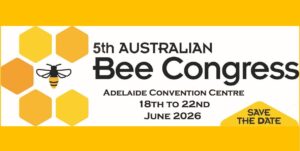
I will be attending the Almond conference in Adelaide towards the end of the month and attending the Northern Australia Biosecurity round table. We will also be working to gather some of our committees together over the next month to progress some the important issues.
Danny LeFeuvre
CEO
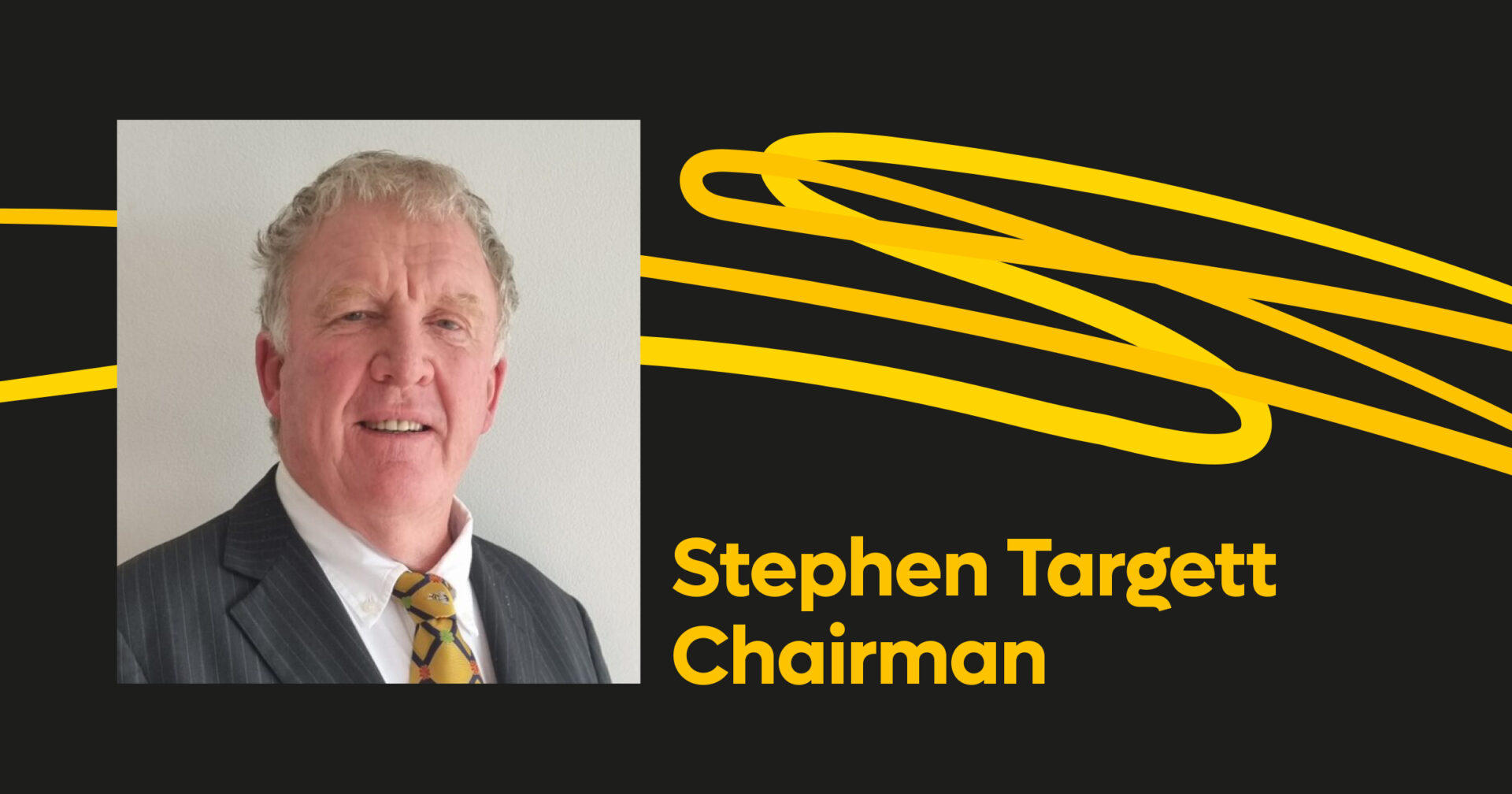
While most beekeepers are busy with spring build up, honey production and providing pollination services AHBIC continues to work behind the scenes.
AHBIC recently held an executive meeting where the decision was made to hold the 5th Australian Bee Congress in Adeliade in 2026. This has started the Congress sub committee that is being chaired by Shona Blair, who was also the chair for the 2022 Congress in Sydney. This sub committee will be meeting regularly to embark on the task of organising the congress which is set for 18th to 22nd June 2026.
The Code of Practice is being revised and beekeepers from all states will be asked for feedback.
Congratulations to Lindsay Callaway of Warral Maldon Honey, who was voted onto the board of directors at the recent BQual AGM. Lindsay has completed a director’s course and his company has been Quality Assurance (QA) accredited with BQual for many years. Lindsay also has international QA accreditation. I am certain Lindsay will become a valuable addition to the BQual board.
Unfortunately, another Australian generational beekeeping family has lost a stalwart of the industry with the passing of dear Shirley Stephens in Tasmania. Shirley was recently commended by her peers in industry by being presented the Goodacre Award for services to the bee industry. Our thoughts and deepest condolences are with Shirley’s family at this time.
AHBIC executive have planned meetings with APVMA to gain a deeper understanding of what AHBIC can do to attract and register more varroa management tools. We also have meetings scheduled with Plant Health Australia in the coming months.
Stephen Targett
Stephen Targett
Chair
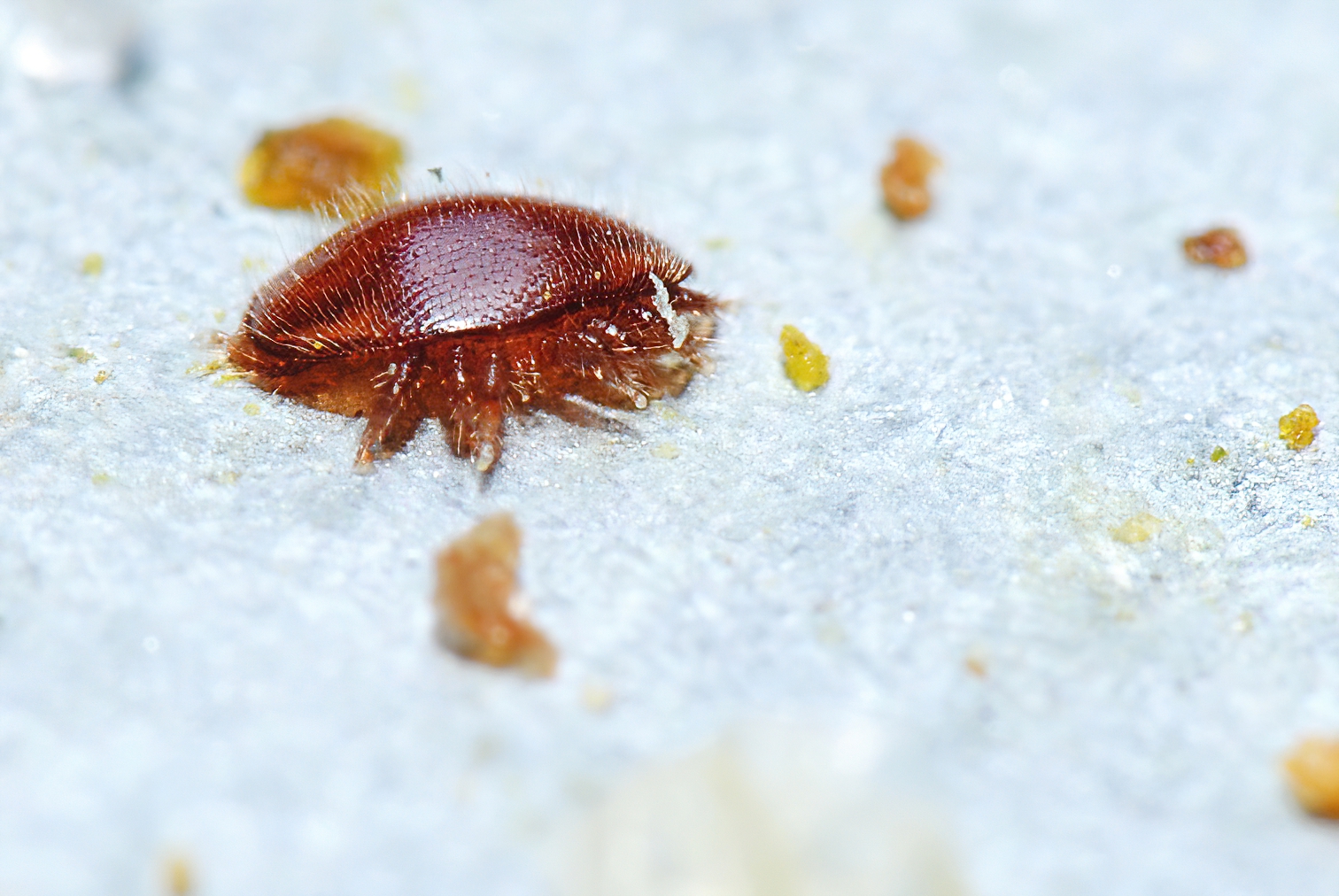
In October 2024 Macquarie University begins a five-year project led by Dr Théotime Colin to discover the best methods to manage the varroa mite in Australia.
The project is possible thanks to a $2.5 Million dollar donation to Macquarie University from the Ian & Shirley Norman Foundation. The Foundation supports initiatives that align with its core pillars: Being ecologically sound; Protecting people from harm; Walking together with traditional custodians; and Empowering communities. Tracy Norman, Founder & Chair of the Foundation, is herself a beekeeper and was required to destroy her hives in the Hunter Valley because of the varroa incursion. Her dedication to finding sustainable non-chemical solutions and supporting Australian beekeepers is inspired by this experience.
“It is hugely significant that the Ian & Shirley Norman Foundation has taken the lead in helping beekeepers address the varroa crisis” said Professor Andrew Barron, a researcher on the project. “I hope their generous action might inspire other philanthropists to help out.” he added.
The project will focus on non-chemical methods to control the varroa mite. Current treatments are primarily chemical based, affecting both bees and their products and leaving chemical residues inside beehives, potentially in honey and wax and impacting the bees. The five-year project aims to create non-chemical alternatives that work in Australia’s environments to give a wider range of control option to beekeepers. Dr Colin’s research team will focus on physical and mechanical control methods, consulting with beekeepers and peak industry bodies throughout the project to ensure solutions meet industry needs.
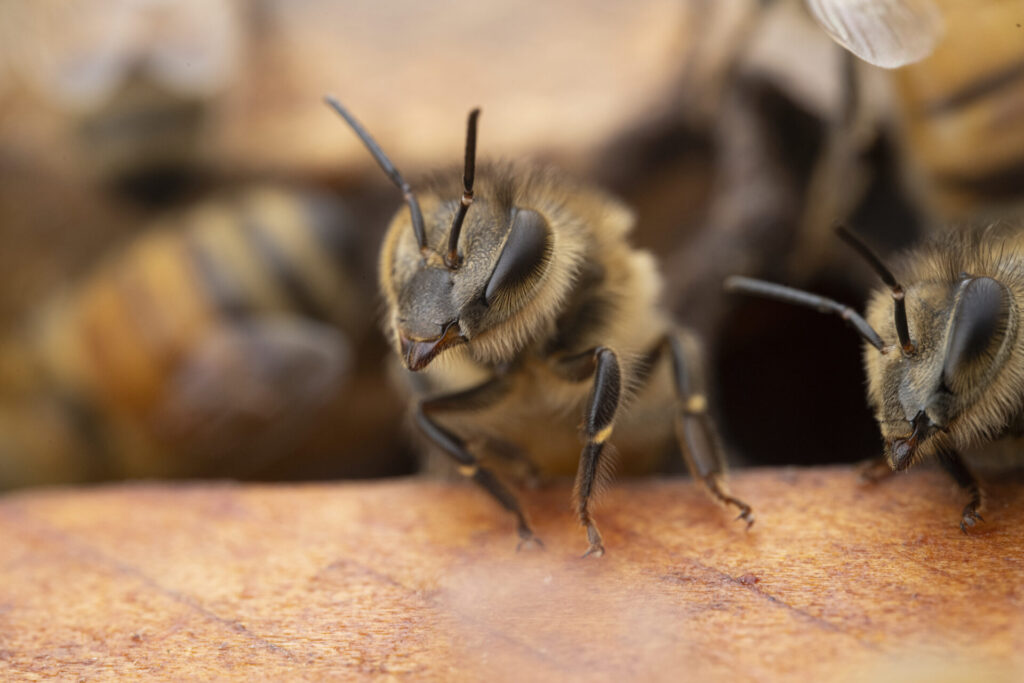
According to Professor Andrew Barron early studies indicate that Australia may not yet have the most serious viruses spread by the mite in other parts of the world. This means it will be easier to manage varroas for a while at least, which gives us a critical window of opportunity to develop effective management techniques.
“Our goal is to develop effective, non-chemical control methods that Australian beekeepers can use to manage this destructive parasite,” says Dr Colin. Proposed strategies include modifying hive environments, enhancing bee grooming behaviours, altering mite behaviour, and developing physical barriers to disrupt mite movement.
The mite reproduces on developing bees. Managing varroa in Australia could be tricky because in many areas hives have brood all year round, which means there is never a break in the mites’ reproductive cycle. The team is exploring how effective imposing a break in brood production on a beehive can be in reducing varroa mite populations in the hive. “Artificial brood breaks are useful in managing varroa in some parts of the world, but we urgently need to know how effective it will be in Australia and how best to do it to minimise stress on the bees and the cost to beekeepers,” said Dr Colin.
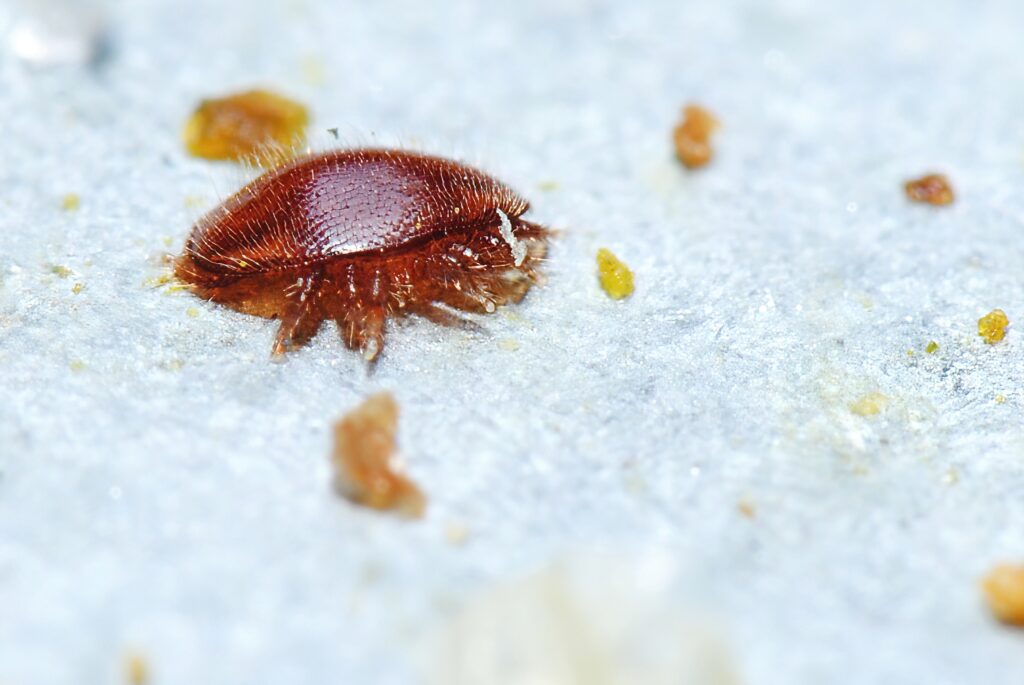
The project team from the School of Natural Sciences includes Dr Cornelia Sattler, who will lead beekeeper consultations and field days, and Casey Forster, who will conduct field trials and efficacy assessments. Dr Ryan Warren from the University of Tasmania will test the treatments’ effects on bees in varroa-free environments and cooler climates. “Another vital outcome of the project will be a huge step up in research capacity for managing varroa in Australia,” said Dr Barron. Prototype testing will be conducted at Macquarie University’s Field Research Apiary, and promising methods will progress to field trials with beekeepers across various Australian environments.
The project will involve extensive collaboration with commercial and hobbyist beekeepers, industry bodies, and government agencies to ensure the developed methods are practical, affordable, and meet regulatory requirements. “It is vital that everything we develop is practical and affordable for beekeepers, so consultation is a vital part of the project,” said Dr Colin.
Joe Skuse, Board member of the Ian & Shirley Norman Foundation highlighted the foundation was “pleased to support this critical research that aims to safeguard Australia’s honeybee population and the vital pollination services they provide before it is too late”. For more information about the Ian & Shirley Norman Foundation and its mission, visit isnfoundation.org.au.
Article written by Dr Theotime Colin, Macquarie University

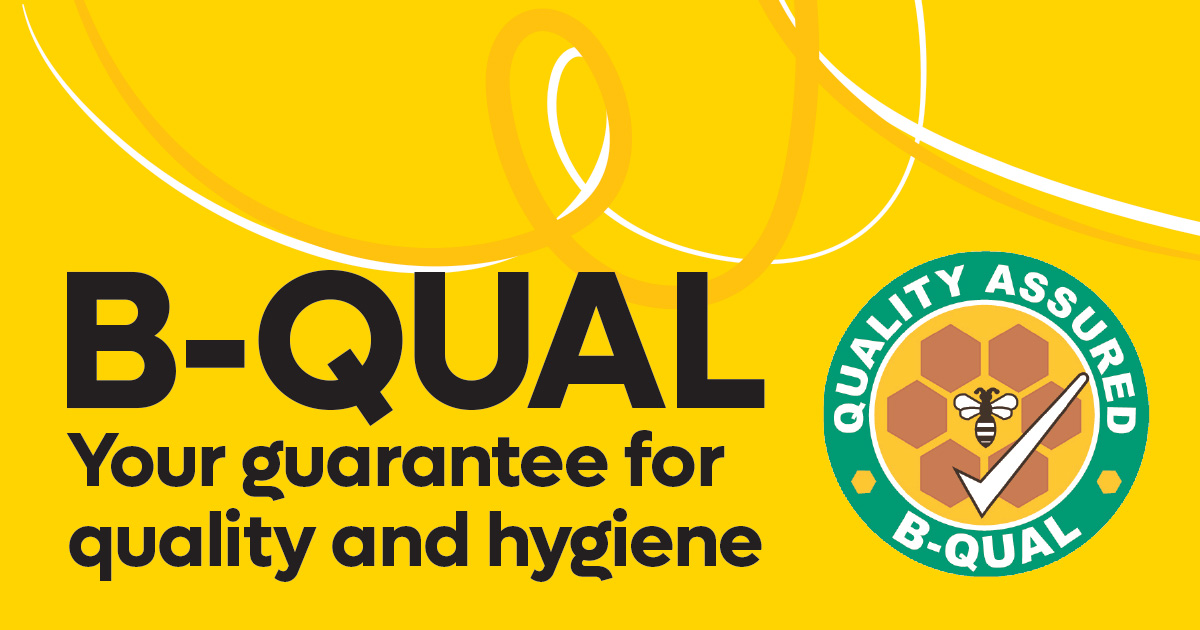
B-QUAL is an Industry Owned Quality Assurance System for Australian beekeepers.
How does B-QUAL certification benefit my business?
B-QUAL Certification also enables an enterprise to market its product under the B-QUAL logo to show that it meets the B-QUAL Industry Standards.
Complete your training at home at your own pace.
For more information and to obtain a Certification Information Pack, contact the B-QUAL Certification team.
www.bqual.com.au
B-QUAL Pty Ltd
Phone 07 49949820
Email: admin@bqual.com.au